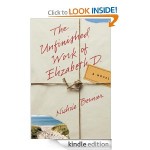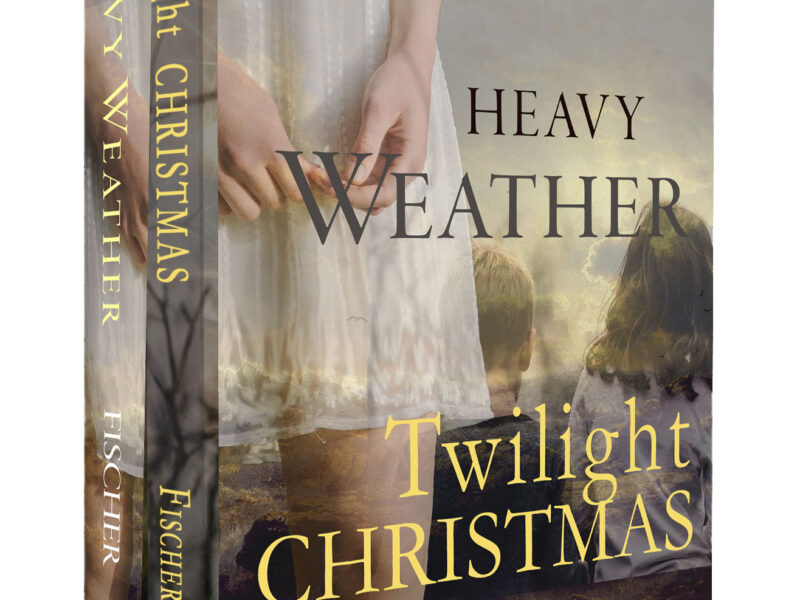Have you ever noticed that some friendships require work? You really like her, but sometimes your smile seems fixed, because she’s just so complicated. Her world has so many hills and valleys. Fine, yours does, too, but they’re yours, after all, and her issues remind you of the times you didn’t quite make it all the way to the top and over. Or the days when the valleys felt as if they extended for hundreds of miles.
The Unfinished Work of Elizabeth D. by Nichole Bernier isn’t a fun book. As Kate reads Elizabeth’s journals, she works through her own issues in this character-driven fiction. There’s little fluff, few hoots of laughter—and those only from moments when I could say, oh, yeah, been there. You know, the embarrassed hiccup that morphs into a laugh and then finds itself stifled by a hand covering the open lips?
That’s what the author has done here: forced me, the reader, to contrast the characters’ experiences with my own. To dig a little deeper into motivations. When Kate examines truth—how much Elizabeth hid about herself and how much she, Kate, has also hidden and misunderstood—I remember bits and pieces of my own history. And I consider larger issues of truth and lies, of comfort and remorse, of the known and the unknowable.
The thing is, our life needs both the easy, relaxed friendships and the hard-earned ones, the stories that we read with laughter and sighs and the ones that make us stop and think, ones we set aside momentarily as we wrestle with the emotions they evoke. Nichole has done a fine job of creating characters worth knowing—fully developed and rich.
Yes, the Kindle version is pricey. The thing is, I bought the book because I read a blog post by Nichole and wanted to know her. In recent months, I’ve clicked Buy on so many freebies and under-three-dollar bargains that have barely kept my interest through chapter three. Books that vanished under the Delete key. And it’s been a very long time since I’ve bothered to review a book.
But this one is worth the time to read and to critique. This author has crafted hard-to-love characters who have crept in and found their place as friends. Friend s who’ll stick around in memory as they challenge me to deeper, better, more honest relationships. And isn’t that the best one can say about a book, any book?
s who’ll stick around in memory as they challenge me to deeper, better, more honest relationships. And isn’t that the best one can say about a book, any book?
I’d love to talk books with you. If you’ve read others that stimulated the responses I’ve mentioned, books that you remember long after you’ve finished reading them, with characters who have forced you to dig a little deeper, please leave a comment. Next week, I’ll pick one commenter to receive a free copy of Nicole’s book. (Kindle preferred so I won’t have to foot the shipping cost!) Yes, readers, a freebie. Aren’t I sweet?
(You may wonder why I’m giving away a book from an author I don’t even know. Well, here’s my rationale. Nichole writes high-caliber women’s fiction. That’s my writing goal. So, if you like Nichole’s, I may be able to entice you to buy mine when it’s available. See, sneaky as opposed to sweet. A method to my generosity. I mentioned honesty and transparency in this post, didn’t I?)


Thank you so much for your review. As a personal friend of the author, I’m biased, but I feel compelled to point out that another dimension of the interplay you describe is between the MEN and WOMEN – not just in the book but in life. My wife and I both read the book and there is so much unspoken truth between these pages. So, I’m not sure I agree the term “women’s fiction” is really the best. But Kate and Elizabeth are always lurking in the corner of my mind, catching me if my mind wanders into treacherous waters of what it means to hide something from those around me.
Absolutely, Brad. I love the fact that you, a man, felt as I did about the work. I first discovered Nichole on a women’s fiction blog site, but agree that the term seems limiting. I didn’t start out to write women’s fiction and actually consider my work more Southern fiction, but my agent said I needed a genre that defined the prospective readership. Fine, mine readers are more than likely going to be women.
But shall we just call Nichole’s story excellent? I suppose if you win a copy, you can always give it away to someone who hasn’t read it yet, and we’ll have a whole slew of folk hankering after transparency!
Well, I’m adding this book to my list.
I’m reading one right now, They Almost Always Come Home by Cynthia Ruchti that I’m really enjoying. The emotions are so raw and so real, it has been hard to read at time. Yet I find I can’t put it down. Can’t say yet if I recommend it–depends how it ends. (Unlike some people I know, I don’t read the endings first).
Ha! Let me know how you like that one. So far, you’re one for one on your recommendations to me, though that one didn’t compel a review. This one showed up as I was reading the story.
Thanks, Normandie, and Brad, for your comment. These past few months since the book came out have made me question preconceived notions about gender reading habits, too. I went along with Random House when the labeled and marketed it as women’s fiction, and have been pleasantly surprised by the number of men who’ve said the book resonated with them. I think it does men a disservice when there’s an assumption that a book has to have car chases, war and deer hunting to be a men’s literature, don’t you?
Absolutely, Nichole. I read so-called men’s fiction all the time. When I submitted my work to various contests last year (in desperate need to know if the only ones who liked it were my critique partners and my agent–such fun with wins. Shallow, shallow, I know), several judges asked if I were a man. It’s terrible to have found that flattering, isn’t it? I mean, oughtn’t we be writing what compels us, women or men? Without worrying about genre and labels? Sigh.
When a woman writes about relationships and family, it’s women’s fiction. When a man writes about relationships and family, it’s literature.
😉
Sad state of affairs, Jane.
I’ve had another male reader respond that this story is not women’s fiction. So, men, I’ll send you one if I draw your name from the hat.
great blog post – some writers are artists – their paintings hold something that is beyond fiction. And to be able to express relationships in such a way is truly a blessing.
It is, Shamira. I love reading a book whose characters prod me to examine essential themes.
Normandie, your beautifully written review convinces me I should read this book. Please put my name in the hopper.
You’re in, Donn. And such a compliment from you means a lot. Merci mille fois.
Hi Normandie. I love the review and would really enjoy to read this book. Please add my name to the list.
[email protected].
Thanks!
Done, Patti. So glad you stopped by. I think you’ll love this book. (So, do buy it if your name doesn’t leap out of the hat.) You and I seem to have similar tastes in literature.